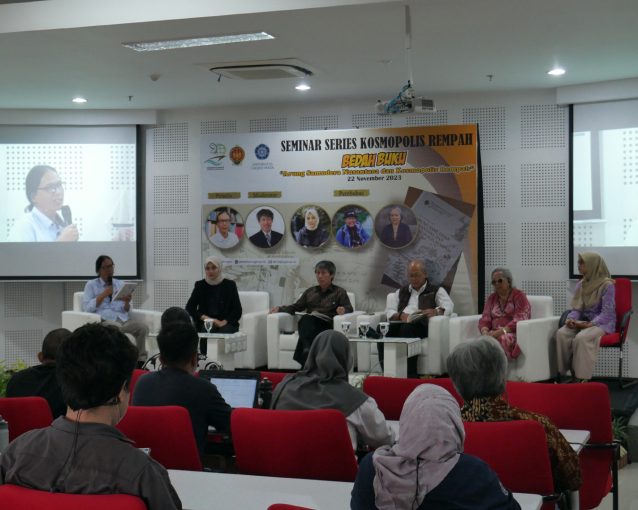
On Wednesday, November 22, the Faculty of Cultural Sciences UGM held a book review event named “Bedah Buku: Arung Samudera Nusantara dan Kosmopolis Rempah” in Room 709 of the Soegondo Building. This event is one of a series of the Seminar Series Kosmopolis Rempah, as the result of collaboration between the faculty along with Kundha Budaya DIY and the Tim Kosmopolis Rempah UGM.
This event was attended by Dr. Sri Margana, M. Hum. as a speaker and book author. Apart from that, there were three responders with different scientific backgrounds, namely Dr. Widya Fitria Ningsih, History lecturer at FIB UGM; Prof. Dr. M. Baiquni, M.A., Professor of Development Geography UGM; and Prof. Dr. Ir. Sri Gardjito, Spice Expert, Faculty of Agricultural Technology, UGM. There was also Prof. Dr. Mustofa, M.Kes., Professor of Pharmacology and Therapy FKKMK UGM and Head of the Tim Kosmopolis Rempah UGM, as the moderator.
Sri Margana started the event by explaining the background to the writing and substance of her book. He said that his book is a response to an application of “Jalur Rempah” as a world heritage by the Indonesian government and the establishment of the Spice Cosmopolis Research Unit at UGM. According to him, the term Jalur Rempah is problematic because it refers to a colonial trade route marked only by physical colonial remains, such as forts and ports. Starting from this issue, he proposed to highlight the influence of spices themselves, namely the creation of a culture of using spices. Therefore, he uses the term “cosmopolis” because the culture of spices has spread throughout the world. He also proposed the word “cosmopolis” to name the UGM Spice Cosmopolis Research Unit.
Widya as the first responder then highlighted this book from a historiographic perspective. According to her, the dominant use of foreign sources can be an opportunity for further studies to use local sources. By using local sources, local perspectives that are not recorded by foreign sources can be told. Apart from that, she also hopes that there will be further studies on spices in Indonesia from a gender perspective. According to her, the historiography on this matter is still dominated by narratives about men’s roles. In fact, spice culture cannot be separated from the role of women, such as in trading, planting and processing spices.
After that, the presentation was continued by Prof. Baiquni, emphasizing the strong connection between history and geography. From the spice trade, humans have established relationships with their environment. The role of spices in human life cannot be completely replaced by current technology. Therefore, spices can be a reminder for people to preserve their environment.
Relations between people from different islands to continents were also established through the spice trade. This relationship then produces a cultural product, one of which is food. Prof. Sri Gardjito explained that spices and the sea as trade intermediaries greatly influenced our food today. From spices and the sea, there is intercultural interaction which results in a combination of processing techniques, ingredients, and even the taste of food. This is considered to be the impact of the cosmopolitan spice trade. One example of the results of the spice trade is black pepper chili sauce, which still exists today and the spices have not changed.

